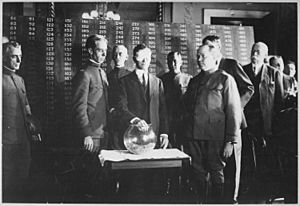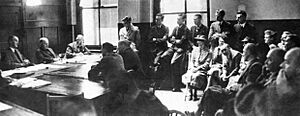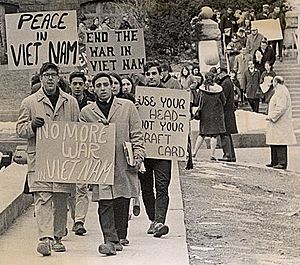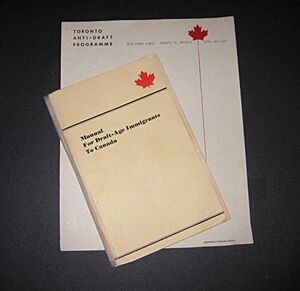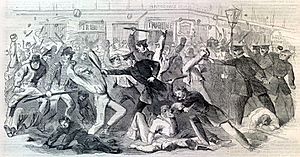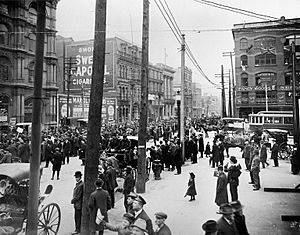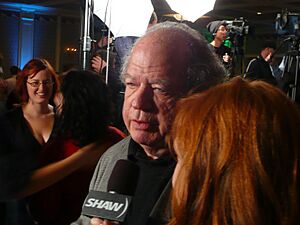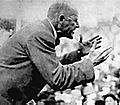Draft evasion facts for kids
Draft evasion is when someone tries to avoid joining their country's armed forces when the government says they have to. This is often called a "draft" or "conscription". It means a person is legally required to serve, but they try to find a way not to.
People have tried to avoid the draft in many wars throughout history, especially in the 1900s and 2000s. When someone avoids the draft without permission, it is usually against the law.
Contents
Understanding Military Drafts
A military draft, or conscription, is a system where a country requires its citizens to join the armed forces. This usually happens during times of war or national emergency. The idea is to make sure the country has enough soldiers to protect itself.
Why Do Countries Have Drafts?
Countries use drafts to quickly build up their military. This is often needed when there's a big conflict or a threat to national security. It helps ensure that everyone shares the responsibility of defending the nation.
Who Gets Drafted?
Usually, drafts apply to young men of a certain age. Sometimes, they can include women too. People are often chosen through a lottery system, like drawing numbers. If your number is picked, you might have to report for service.
Ways People Avoid the Draft
People have used different methods to avoid serving in the military. Some of these ways are legal, while others are not.
Legal Ways to Avoid Service
Sometimes, there are legal reasons why someone might not have to serve.
- Medical Reasons: If someone has a serious health problem or injury, they might be excused.
- Family Hardship: If a person's family would suffer greatly without them, they might get an exemption.
- Essential Jobs: People in certain jobs, like doctors or farmers, might be needed more at home.
- Conscientious Objection: Some people refuse to fight in wars because of their strong moral or religious beliefs. They might do other forms of national service instead.
Illegal Ways to Avoid Service
Other ways to avoid the draft are against the law.
- Not Registering: Some people simply do not sign up for the draft when they are supposed to.
- Fleeing the Country: Many people have left their home country to avoid being drafted.
- Hiding: Some individuals try to stay hidden within their own country to avoid being found by military officials.
- Destroying Draft Cards: During some wars, people would burn or destroy their draft cards to protest the war.
Famous Cases of Draft Evasion
Throughout history, many people have become known for their actions related to draft evasion.
Vietnam War Era
During the Vietnam War (1955-1975), many young Americans opposed the war. A large number of them tried to avoid the draft.
- Protests: Many students and activists held protests against the draft and the war. They encouraged others not to serve.
- Moving to Canada: Thousands of young Americans moved to Canada to avoid being drafted. Canada became a safe place for them.
- Public Figures: Some famous people, like musician Phil Ochs, spoke out against the draft.
Other Conflicts
Draft evasion has happened in many other conflicts around the world.
- World War I: In 1917, there were large protests against the draft in New York City.
- Syrian Civil War: By 2016, many thousands of people had left Syria to avoid being drafted into the conflict.
Impact of Draft Evasion
Draft evasion can have a big impact on both individuals and countries.
For Individuals
People who illegally avoid the draft can face serious consequences. They might have to live outside their home country for many years. Some might even face legal trouble if they return. However, some draft evaders have gone on to become important figures in their new countries.
For Countries
When many people avoid the draft, it can make it harder for a country to raise enough soldiers. This can affect a country's ability to defend itself or fight in a war. It can also lead to debates within the country about fairness and who should serve.
Images for kids
-
Aleppo during the Syrian Civil War. By 2016, 70,000 draft evaders had fled Syria, and others remained undetected inside it.
-
Eugene V. Debs spoke out against the draft during World War I.
-
A Vietnam War-era draft card. Keeping the card was legally required.
-
Phil Ochs (1940–1976) was one of several countercultural figures to encourage draft evasion.
-
David Harris and "The Resistance" helped organize Stop the Draft Week in Oakland, California, October 1967.
-
Ted Nugent, shown here addressing a Republican function in a military-style shirt, reportedly took extreme measures to avoid the draft. (Photo by Gage Skidmore.)
See also
 In Spanish: Insumisión para niños
In Spanish: Insumisión para niños
 | Jewel Prestage |
 | Ella Baker |
 | Fannie Lou Hamer |


